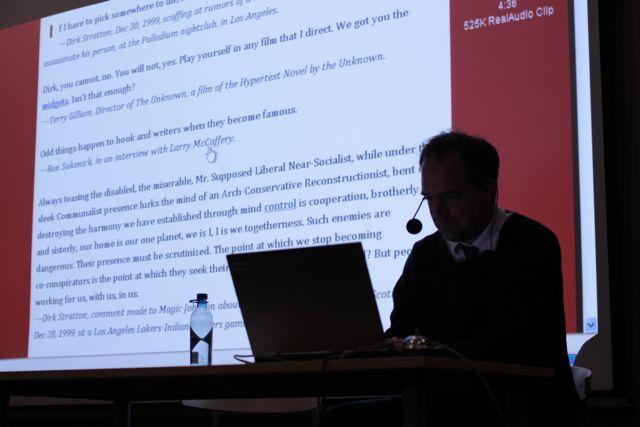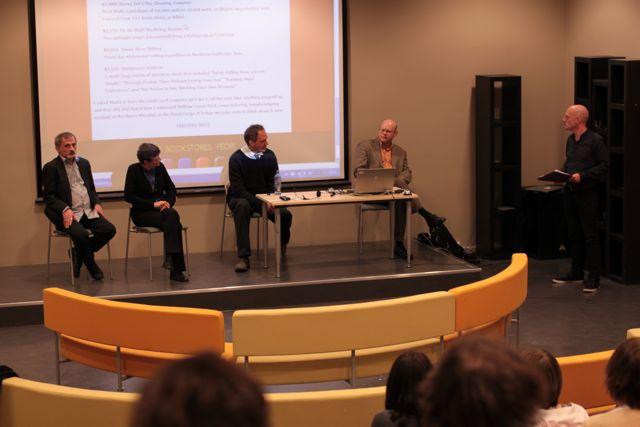Kinetic poetry and hypertext novels at the library
The first public event of the newly founded research group for electronic literature at LLE led to both theoretical discussions and enjoyment.
Hovedinnhold
On May 2nd 2011, UiB's Electronic Literature Research Group organised two events at the new auditorium at the library, in collaboration with Vagant and Bergen Public Library. At an afternoon event we saw a presentation of works from the Electronic Literature Collection 2 by two of its editors, Rita Raley and Talan Memmott, followed by a discussion of the process of creating an anthology of electronic literature between Raley, Memmott and two editors of the first edition of the collection, Scott Rettberg (who is also head of the University of Bergen research group for electronic literature) and Stephanie Strickland. An evening event featured performances of works from both the first and second volume of the Electronic Literature Collections, followed by a question and answer session led by Vagant's Audun Lindholm.
We still read the texts of Ovid, Shakespeare and Ibsen, but will the fiction written for the web last as long? This question was one of the reasons why the Electronic Literature Collection series was established. Collecting work in a series of anthologies is a way to secure an archive of the ever-changing field of literature written for digital media. Indeed, the technology changes so fast that one of the works from ELC2 which was performed Monday night, Lexia to Perplexia, written by the American-born Swedish resident Talan Memmott in 2000, no longer works in modern browsers. Fortunately for us, Memmott was able to find a version of the poetical-theoretical work that worked for tonight's performance.
Stephanie Strickland read from the works V:niverse and Slipping Glimpse, which are examples of generative and kinetic poetry, coupling online experiences with paper publications. Strickland explained how the text of "Slipping Glimpse" is programmed to flow through the background videos of water, as a leaf or twig caught in the water follows its movements. William Gillespie read from his Letter to Linus, a cycle of prose texts conceptualized as a cube where the text from each of the six sides can lead to any of four adjacent sides. Then Gillespie introduced his collaborator Scott Rettberg, director of the Electronic Literature Research Group and the host for today's event, and the two performed some of their award-winning hypertext novel The Unknown 1999. This novel is about a group of young writers, who have the same names as the actual authors, and as a great success with his hypertext novel "The Unknown". They travel on a book tour that gets wilder and wilder, and end up making a Hollywood film of the novel, starting a cult, and dying in absurd and inventive ways. The audience was eager participants, yelling out links for Gillespie and Rettberg to follow, with much laughter and enjoyment.
After the performances there were questions from the audience, led by the editor of the literary journal Vagant, Audun Lindholm. For the last year and a half, Vagant has published a regular column on electronic literature, written by Scott Rettberg. Lindholm is also editor of the micro-publishing house Gasspedal, which under the title Gasspedal Animert publishes animated poetry.
The events marked the start of a new partnership between the Electronic Literature Research Group and Bergen Public Library. In addition to the use of the auditorium and technical assistance, the library has set up a separate computer among the bookshelves where readers can explore the anthology itself. The screen is also projected on the wall above the bookshelves - take a look at the pictures the library has posted on their Facebook page to see how it works, or stop by yourself. In the long term, the library and the research group for electronic literature will work on finding ways to draw electronic literature into the library on a more permanent way, perhaps at work written specifically for this site, a site-specific literary installation.
Rita Raley, one of the editors of ELC2 and an key theorist of electronic literature and digital art is currently visiting Digital Culture at UiB as a Fulbright specialist, and will be in Bergen until 18 May. She is Associate Professor of English Literature at the University of Santa Barbara.

